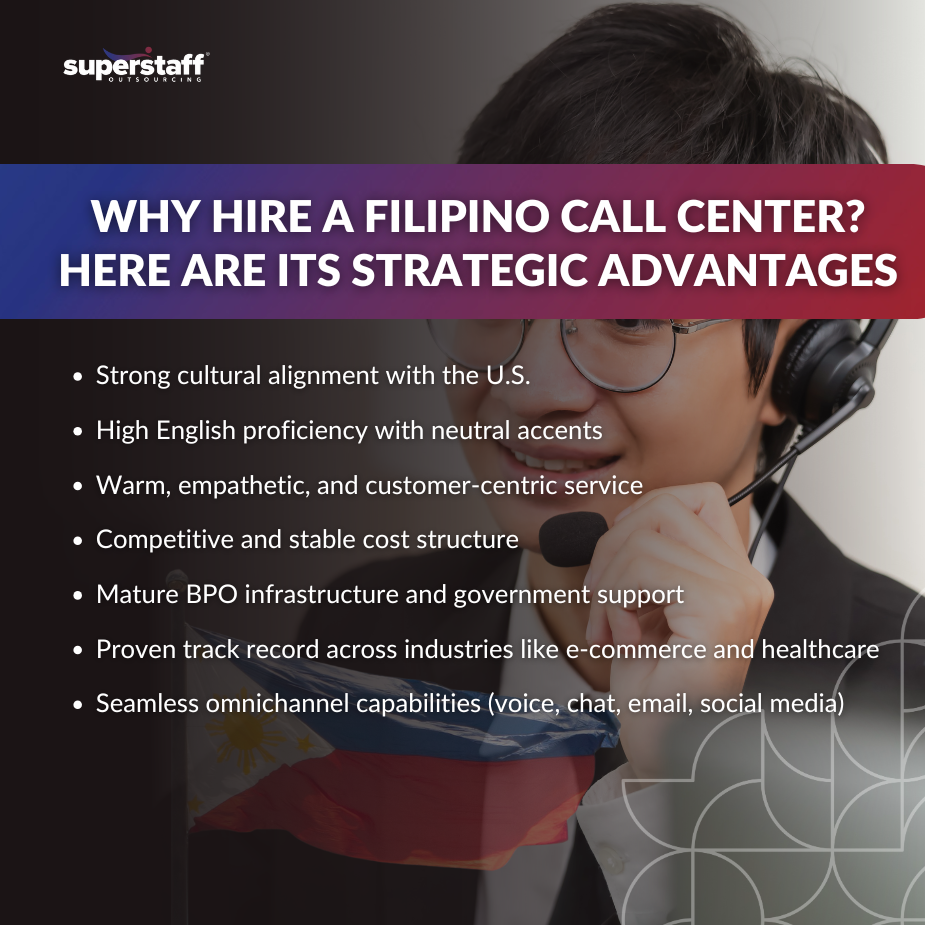
In today’s global marketplace, customer service outsourcing has become more than a cost-saving move; it’s a growth strategy. As brands race to meet rising consumer expectations, regions like India, Latin America, and the Philippines have emerged as top destinations for outsourced support.
Among these, the Filipino call center continues to earn global recognition, not just for affordability, but for exceptional service quality, cultural compatibility, and communication excellence.
But with so many options available, what truly sets Filipino call centers apart from the rest? Why do some of the world’s most trusted brands choose to build their support teams in the Philippines?
In this blog, we break down the unique strengths of the Filipino call center industry and compare it with other leading markets. If you’re weighing your options, this guide will help you make an informed decision rooted in performance, partnership, and long-term value.
Global Call Center Landscape – The Big Players
The global call center industry is thriving, with several markets competing to lead the space.
Countries like the Philippines, India, Latin American nations (like Colombia and Mexico), and Eastern European hubs (such as Poland and Romania) have become major players in the business process outsourcing (BPO) space. Each of these markets offers its own strengths, from cost efficiency to language diversity and technical expertise.
Call centers today handle more than inbound customer service. They offer outbound sales, technical support, order processing, retention efforts, and even tier-2 escalation handling. Industries that most frequently rely on call centers include e-commerce, healthcare, telecom, fintech, SaaS, and travel.
India is often praised for its IT knowledge and vast workforce. Latin America appeals to U.S. brands seeking time zone alignment and Spanish-speaking talent. Eastern Europe draws in companies looking for multilingual support across EU markets.
Yet while many markets offer similar services, the Filipino call center continues to attract brands that prioritize quality and connection.
The Cultural Compatibility Advantage of Filipino Call Centers
Cultural affinity plays a major role in customer satisfaction—and this is where Filipino agents shine.
One of the most notable advantages of working with a Filipino call center is the country’s cultural alignment with the West, especially the United States. This affinity stems from a deep-rooted history, Western-influenced media consumption, and a strong grasp of American slang, idioms, and humor.
Filipino agents are known for their empathy, “Yes Po” culture, and “service with a smile” mindset. This results in warmer, more personalized customer interactions that build rapport quickly.
By contrast, agents in India are often perceived as more formal in tone. While this can work well in technical support settings, it may hinder natural-feeling conversations in industries like retail or travel. In some cases, cultural disconnects can lead to CX breakdowns, with customers feeling misunderstood or frustrated.
BPO companies in the Philippines avoid these pitfalls by offering agents who can mirror the tone, cadence, and empathy of native English speakers.
Beyond culture, communication is key—and the Philippines consistently ranks high in language proficiency.

English Proficiency and Accent Neutrality
If you’re wondering why global companies prefer call centers in the Philippines, here’s why: Clear communication builds trust, and the Southeast Asian nation leads in English fluency and accent neutrality.
The Philippines consistently ranks among the top countries in the Global English Proficiency Index. With English as one of its official languages, the country emphasizes English instruction from early education through university. This foundation translates to call center agents who are not only fluent but also confident communicators.
One standout feature of the Filipino call center workforce is its accent neutrality. Compared to the more varied and sometimes regionally thick accents of India or parts of Eastern Europe, Filipino accents are generally clearer and easier to understand for North American customers.
This advantage is bolstered by voice training programs offered by most Filipino call centers. These programs enhance diction, reduce speech fillers, and help agents manage tone and pace—creating a smoother customer experience overall.
Of course, communication is only one side of the equation—work ethic and service attitude matter just as much.
Service Quality and the Filipino Work Ethic
Filipino agents are known not just for their skill—but for their heart.
Hospitality is deeply ingrained in Filipino culture. This translates to a warm, caring approach to customer service that emphasizes patience, attentiveness, and problem resolution. Many clients describe Filipino agents as genuinely invested in the customer’s experience—not just checking boxes.
This attitude, combined with a strong sense of loyalty, contributes to lower attrition rates among Filipino call center employees. Agents often stay with their companies longer, building more experience and delivering better service continuity.
In comparison, some outsourcing markets struggle with high turnover, which leads to knowledge gaps, increased training costs, and inconsistent service delivery.
The result? Filipino call centers deliver higher training ROI, more stable teams, and deeper institutional knowledge over time.
With these human strengths in place, the Philippines has also built the infrastructure to support global operations.
Mature BPO Ecosystem and Government Support
The Philippines’ outsourcing success is no accident—it’s backed by decades of experience and strategic investment.
The country’s BPO industry, which includes the Filipino call center sector, has grown steadily since the early 2000s. Industry bodies like the IT and Business Process Association of the Philippines (IBPAP) have worked closely with government agencies to develop a competitive workforce and create business-friendly policies.
Established hubs in Metro Manila, Cebu, Clark, and Davao offer modern infrastructure, reliable internet connectivity, and access to a large talent pool. The government has also invested in education initiatives focused on IT and English communication skills, ensuring a steady pipeline of qualified professionals.
As demand for multilingual and omnichannel support grows, Filipino call centers have evolved to offer chat, email, social media, and voice services seamlessly.
With these pillars in place, how do Filipino call centers truly stack up in a side-by-side comparison?
Side-by-Side Comparison – PH vs. Other Markets
Let’s break down the most important decision factors by region.
English Proficiency
- Philippines: High; near-native fluency and neutral accent
- India: Moderate to high; strong fluency but noticeable regional accents
- Latin America: Moderate; growing English skills, but uneven across countries
- Eastern Europe: Moderate to high; some countries excel, others are developing
CX Quality and Empathy
- Philippines: High; empathy-driven culture
- India: Medium; more transactional tone
- Latin America: Medium to high; friendly but may vary by agent training
- Eastern Europe: Medium; efficient, but less warm in tone
Cost Efficiency
- Philippines: Competitive and stable
- India: Competitive but increasing wages
- Latin America: Slightly higher; influenced by inflation
- Eastern Europe: Higher operational costs
Scalability
- Philippines: High; established ecosystem and talent supply
- India: Very high; large workforce
- Latin America: Moderate; depends on city/region
- Eastern Europe: Limited; smaller talent pools
Attrition Rate
- Philippines: Low to moderate; high job loyalty
- India: High; competitive job market
- Latin America: Moderate; improving HR practices
- Eastern Europe: Moderate to high; varies by country
This comparison reveals that for many U.S. brands, the Philippines offers the most balanced value.
Industry Use Cases – Why Brands Choose the Philippines
Global brands continue to bet on Filipino talent for a reason.
Take, for instance, a major North American e-commerce retailer that outsourced its entire post-purchase customer support to a Filipino call center. The result? Faster resolution times, higher CSAT scores, and a significant drop in escalations.
In the healthcare sector, U.S.-based providers rely on Filipino agents for patient support, appointment scheduling, and claims follow-up. These services require not only accuracy but empathy—something Filipino agents are naturally inclined to provide.
SaaS companies often choose Filipino call centers for Tier 1 tech support and account management. The mix of technical training and people skills makes Filipino agents ideal for both solving issues and retaining customers.
Across industries, clients consistently praise:
- The warmth and professionalism of Filipino agents
- Quick adaptability and commitment to quality
- Ease of collaboration with teams on the ground
With talent, training, and trust on its side, the Philippines is more than competitive—it’s customer-centric at its core.
Looking for Your Ideal Filipino Call Center? Get in Touch With the Experienced Team at SuperStaff!
While other markets have strengths, the Filipino call center offers a rare combination of cultural empathy, communication excellence, and service quality.
From their natural rapport with Western customers to their skilled, loyal workforce and advanced infrastructure, Filipino call centers continue to lead the way in delivering meaningful, high-quality customer experiences.
It’s no surprise that global brands outsource to the Philippines to build customer loyalty, drive revenue, and scale support operations.
Ready to experience the difference that Filipino customer support makes? SuperStaff helps you scale support teams with talent that connects, converts, and retains customers. Let’s talk.






